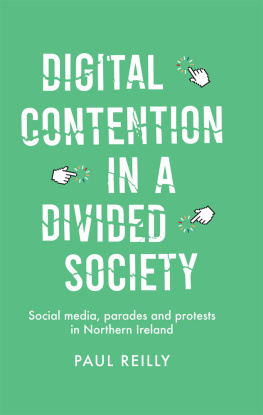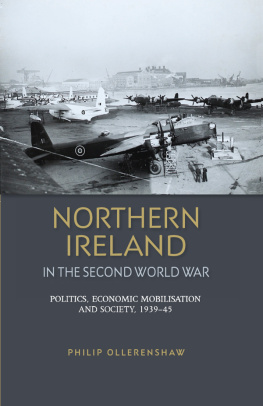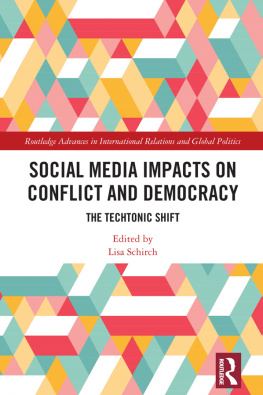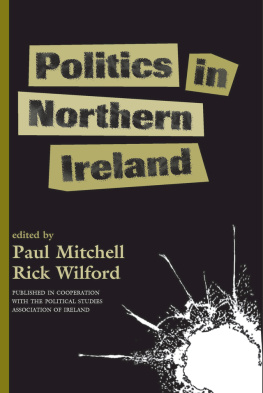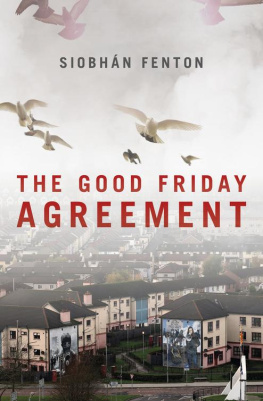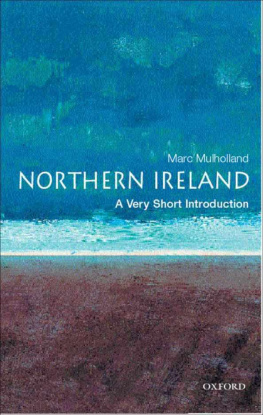Copyright Paul Reilly 2021
The right of Paul Reilly to be identified as the author of this work has been asserted by them in accordance with the Copyright, Designs and Patents Act 1988.
Published by Manchester University Press
Altrincham Street, Manchester M1 7JA
www.manchesteruniversitypress.co.uk
British Library Cataloguing-in-Publication Data
A catalogue record for this book is available from the British Library
ISBN 978 0 7190 8707 3 hardback
First published 2021
The publisher has no responsibility for the persistence or accuracy of URLs for any external or third-party internet websites referred to in this book, and does not guarantee that any content on such websites is, or will remain, accurate or appropriate.
Typeset
by Sunrise Setting Ltd, Brixham
This book draws on nearly ten years of work and could not have been completed without the support of my colleagues, students and friends in Glasgow, Leicester and Sheffield. Part of this research was funded by a small grant from the British Academy and I am grateful to the anonymous reviewers from First Monday for feedback on previous iterations of Chapters 4 and 6. Many thanks to my interviewees and all those who provided help with the social media data collection and analysis. In particular, I would like to express my gratitude to Caitlin Shayda Jones and Miruna Sft (Vrtopeanu); without their support this work would have been much inferior.
This undertaking could not have been realised without the inspiration of research collaborators such as Dima Atanasova, John Coster, Faith Gordon, Darren Lilleker, Rebecca Stevenson, Ioanna Tantanasi, Giuliana Tiripelli, Filippo Trevisan, Anastasia Veneti and Stefania Vicari. A special mention is due to my researchers and those who took my Activism and Protest in the Information Age and Digital Advocacy modules, from whom I have learnt a lot over the past decade. Thanks also to Rob Byron, Lucy Burns and the team at Manchester University Press for their support and assistance in bringing this book to fruition.
Writing a book is very much a marathon rather than a sprint. In this endeavour, I have been fortunate to have the same support team that helped me write Framing the Troubles Online. Thanks to Dad, Mum, Emma, Mark, Colin, Jack and Lucia for everything. However, this book must surely be dedicated to Sarah. It would not have been possible without her love, support, indefatigability and the occasional grammar check. Needless to say, any mistakes in the text are all mine, not hers.
How are platforms such as Facebook and Twitter used by citizens to frame contentious parades and protests in post-conflict Northern Ireland?).
This book contextualises contemporary debates about digital contention by exploring how social media users responded to controversial public demonstrations in Northern Ireland between 20122016. In doing so, it is congruent with the agenda for digital politics research advanced by ).
: 140). Nevertheless, consociational assumptions about the inflexibility of social identities have continued to inform policy-making in the deeply divided society.
Many scholars have argued that a more inclusive approach towards peacebuilding, involving civil society and grass-roots political
In this context, residents groups, such as the nationalist Garvaghy Road Residents Coalition,).
The early signs were that Web 2.0, the popular term for the section of the World Wide Web based on collaboration and the sharing of user-generated content (UGC), might further exacerbate existing sectarian tensions within Northern Ireland. Cyber enthusiasts welcomed this new era of mass-self-communication, in which the self-directed communication of individuals could reach a potential global audience ().
Social media, peacebuilding and the contact hypothesis
This book will explore whether citizen activity on social media during contentious parades and protests inflames or diffuses the sectarian tensions that surround these incidents, which often boil over into intercommunal violence. In this way, it will assess whether these affective publics, activated and sustained by feelings of belonging and solidarity ( posited that a conflictual consensus would emerge as former enemies were recast as adversaries who respectfully disagreed about contentious issues.
There has also been some evidence to suggest that intergroup contact can reduce prejudice against outgroups. First articulated by : 972).
Much of the early literature on cyberspatial technologies suggested that the Internet had the potential to facilitate this intergroup contact within highly segregated societies, where neutral space might be difficult to access or not exist ().
This work has broadly focused on structured intergroup contact, which involves supervised online meetings, and unstructured contact which takes place in less regulated spaces such as websites and public Facebook groups ( for example).
Social media peacebuilding initiatives have been accused of promoting technological solutionism, the term used by : 24). This book adds to this emergent literature by exploring whether the affective publics convened on social media escalate or de-escalate sectarian tensions in Northern Ireland around contentious public demonstrations.
Reconceptualising (digital) citizenship
Social media activity focusing on contentious parades and protests in Northern Ireland can be characterised as acts of digital citizenship.).
Silly citizenship and ritualised social media practices
The performance of citizenship for many citizens increasingly revolves around creating and sharing irreverent content during political debates on social media. Memes and parody accounts are examples of this silly citizenship, in which playfulness is increasingly integral to how citizens perform political deliberation and participation ().
: 61) identifies several ritualised social media practices that are frequently adapted for political purposes. These will be explored throughout this book, so it is worth briefly defining their key characteristics.
First, there are memes, which are broadly defined as pieces of cultural information that pass along from person to person but gradually scale into a shared social phenomenon and have become a visual motif of digital culture (: 1).

